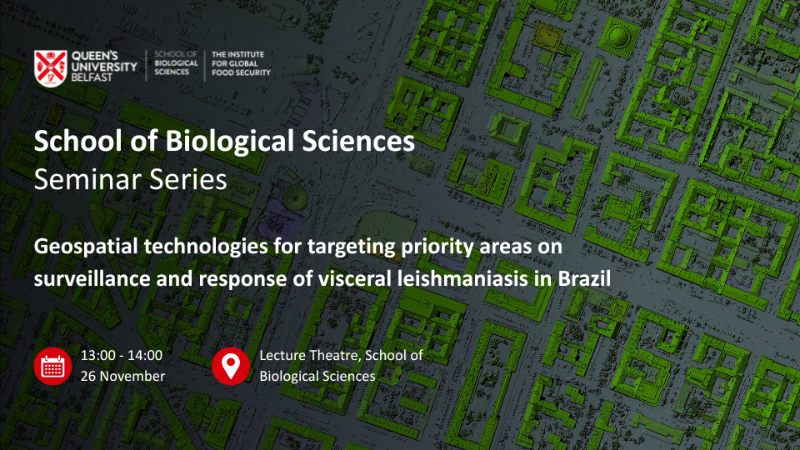We are pleased to welcome Professor Elivelton da Silva Fonseca, Professor, School of Geography, UNIFESSPA, Brazil and Scientific researcher, University of Wolverhampton, UK, to the school.
- Date(s)
- November 26, 2025
- Location
- Lecture Theatre, School of Biological Sciences
- Time
- 13:00 - 14:00
Abstract: Geospatial technologies for targeting priority areas on surveillance and response of visceral leishmaniasis in Brazil.
In 2023, Brazil accounted for 93.5% of visceral leishmaniasis (VL) cases in Latin America. This study adopts a One Health approach to: (i) analyze VL’s spatial distribution using geospatial methods, (ii) assess temporal trends to evaluate COVID-19’s impact, and (iii) identify vulnerable municipal clusters in São Paulo state for targeted surveillance. Data from 1999–2022 were analyzed using the Local Moran Index and Generalized Additive Models. Vector data (Lutzomyia longipalpis) came from São Paulo’s endemic control agency, while canine VL (CVL) data were sourced from the Adolfo Lutz Institute. Environmental variables—NDVI, land surface temperature, and geomorphology—were derived from MODIS and BDiA platforms. Results showed vector presence in 32.4% of municipalities, CVL in 29.0%, and human VL (HVL) in 18.0%. The western region, marked by deforestation and plateau terrain, accounted for 30.6% of high-risk clusters. Although VL cases remained stable during the pandemic, lethality increased, posing future challenges for public health.
About the speaker:
Dr. Fonseca is an ISPF-British Council researcher at the University of Wolverhampton, UK, specializing in Remote Sensing and GIS technologies for controlling Neglected Tropical Diseases. His current projects include evaluating environmental impacts on visceral leishmaniasis transmission, analyzing COVID-19 urban spread in Brazilian metropolitan areas, and studying social vulnerability and territorial conflicts. He holds a Geography degree, a master’s in Environmental Analysis and a PhD in Geographic Space Production from FCT-UNESP, Brazil. His research spans Health Geography, Spatial Analysis, Multicriteria Evaluation, and Remote Sensing. During his postdoc at Louisiana State University's Geospatial Research Lab, supported by FAPESP, he collaborated with NASA’s Marshall Space Flight Center, contributing to a disease-remote sensing database proposal. He also partnered with Australian National University via SPRINT-FAPESP.
- Department
- School of Biological Sciences
- Add to calendar

